Mario Vargas Llosa: “Political correctness is the enemy of freedom”
Besides writing prize-winning fiction, the Nobel Laureate has fought tirelessly for civil liberties. With his new book, ‘The Call of the Tribe,’ he promotes liberal thought and pays tribute to seven authors who embrace it. We talk to him about liberalism, intellectual blindness and the dangers facing democracy today
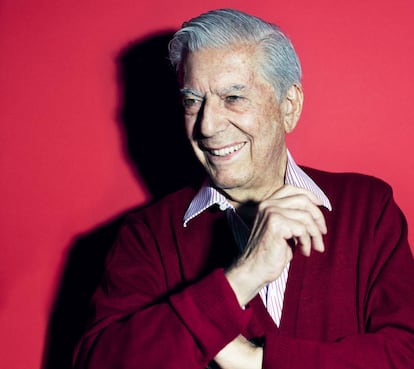
Mario Vargas Llosa is in good form. The Peruvian Nobel Laureate laughs easily as he expounds on his theories of freedom and the individual and talks about his new book, La llamada de la tribu, or, The Call of the Tribe, which argues in favor of liberal thought in reference to seven influential authors: Adam Smith, José Ortega y Gasset, Friedrich von Hayek, Karl Popper, Raymond Aron, Isaiah Berlin and Jean-François Revel.
These men belong to a school of thought that believes in the individual as an autonomous and responsible being, and freedom as the supreme asset. They defend democracy and the separation of powers as the best system available to reconcile society’s contradictory values. They espouse a doctrine that rejects the “tribal spirit” that has historically fueled fascism, communism, nationalism and religious fanaticism. The Call of the Tribe is also an intellectual autobiography that takes the reader from Vargas Lllosa’s Marxist and existentialist beginnings through to his endorsement of liberalism.
Question. Why are there so many attacks on liberal thought?
Answer. It has been targeted by ideologies that are enemies of freedom and which justifiably consider liberalism to be their most tenacious adversary. And that’s what I wanted to explain in the book. Fascism and communism have attacked liberalism strongly, mainly by caricaturing it and linking it to conservatism. In its early stages, liberalism was besieged primarily by the right. There were papal encyclicals – attacks from pulpits everywhere on a doctrine that was considered the enemy of religion and of moral values. I believe that these adversaries define the close relationship that exists between liberalism and democracy. Democracy has moved forward and human rights have been recognized basically thanks to liberal thinkers.
Q. The authors you analyze in your book all swam against the tide
A. Hayek and Ortega even had two books banned. Are liberals condemned to walk alone? Liberalism doesn’t just embrace, it actually stimulates difference. It recognizes that society is composed of very different kinds of people and it’s important to keep it that way. It’s not an ideology; an ideology is a secular religion. Liberalism defends some basic ideas: freedom, individualism, the rejection of collectivism and nationalism – in other words, all the ideologies or doctrines that limit or annihilate freedom within society.
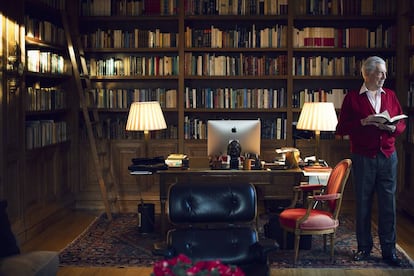
Q. Talking of nationalism, Ortega y Gasset had plenty to say about the dangers of it in the Basque Country and Catalonia. Why do liberals reject nationalism?
A. Because it is incompatible with freedom. You just need to scratch the surface to see that nationalism involves a kind of racism. If you believe that belonging to a certain country or nation or race or religion is a privilege, a value in itself, you believe you are superior to others. And racism inevitably leads to violence and the suppression of freedom. That is why liberalism from the times of Adam Smith has perceived this kind of collectivism in nationalism – the rejection of reason for an act of faith.
Q. Populism, the reemergence of nationalism, Brexit… is there a rebirth of tribalism?
Democracy has moved forward and human rights have been recognized basically thanks to liberal thinkers
A. There’s a trend that opposes what I consider to be the most progressive development of our time – the formation of big entities that are slowing removing borders and incorporating different languages, customs and beliefs, as is happening in Europe. This triggers a lot of insecurity and uncertainty and a great temptation to return to the tribe, to the small homogeneous society that never really existed, where everyone is the same, where we all hold the same beliefs and speak the same language. It’s a myth that generates a great amount of security and that explains revolts such as Brexit, Catalan nationalism or the kind of nationalism that wreaks havoc within democracies as is happening in Poland, Hungary and even Holland. Nationalism is present, but my impression is that, as with Catalonia, it’s a minority and the strength of democratic institutions is going to gradually undermine it until it’s derailed. I’m pretty much an optimist.
Q. Your move from Marxism to liberalism is not unusual. In fact, it’s the same path as taken by some of the authors you analyze such as Popper, Aron and Revel.
A. My generation in Latin America was awoken to reason in a continent of monstrous inequalities and military dictatorships backed by the United States. For a young, somewhat restless Latin American, it was very difficult not to reject this caricature of democracy. I wanted to be a communist. I thought communism represented the antithesis of a military dictatorship, corruption and, above all, inequality. I started at the National University of San Marcos with the idea that there would be communists I could mix with there. And there were. But the communism in Latin America was pure Stalinism, with parties subject to the Comintern in Moscow. I was only militant for a year, then continued to be a socialist in a more relaxed fashion, a stance strengthened by the Cuban revolution, which at first seemed to be a different, less dogmatic style of socialism. I became enthusiastic. In the 1970s, I went to Cuba five times. But gradually, disillusionment seeped in, particularly after the UMAP – Military Units to Aid Production – was introduced. There were raids against young people I knew. It was traumatic. And I remember writing a private letter to Fidel telling him that I was disconcerted, and asking how Cuba, which seemed to be a tolerant and open style of socialism, could put “worms” and homosexuals in concentration camps alongside common criminals. Fidel invited myself and a dozen other intellectuals to speak to him. We spent the whole night, 12 hours, from eight in the afternoon to eight the next morning, basically listening to him speak. It was impressive, but not very convincing. From then on, I became a little dubious. The definitive rupture came with the Padilla case – when the writer Heberto Padilla, jailed in 1971 was obliged to denigrate himself in public, marking the end of the idyllic relationship between important intellectuals and the Cuban regime. I went through a long and difficult process, embracing democracy and moving gradually towards the liberal doctrine – I was lucky enough to live in Britain during the Margaret Thatcher years.
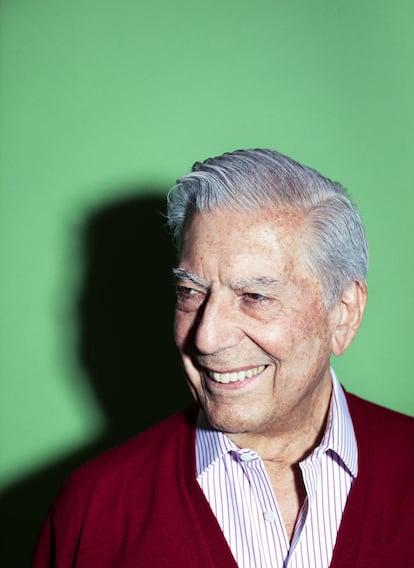
Q. The picture you paint of Margaret Thatcher as a brave, cultured woman of deep liberal convictions, contrasts starkly with the image we have of her.
A. That’s an absolutely unjust caricature. When I arrived in England, it was a decadent country – a country with freedom but whose mettle was being snuffed out gradually by the Labor Party’s economic nationalism. Margaret Thatcher’s revolution woke Britain up. They were tough times; finishing with the sinecure of the trade unions, creating a competent free-market society, and defending democracy with conviction while facing up to socialism, China, the USSR – the cruelest dictatorships in history. They were decisive years for me because I started to read Hayek and Popper, both authors quoted by Thatcher. She said that The Open Society and Its Enemies would be a crucial book for the 20th Century. The contribution of Thatcher and Ronald Reagan to the culture of freedom, finishing with the Soviet Union – the biggest challenge democratic culture had ever had – is a reality that is unfortunately portrayed in a media influenced by a campaign from the left whose achievements are few.
Q. And what is western democracy’s main challenge now?
A. Its biggest enemy now is populism. No one in their right mind wants to model their country on North Korea, Cuba or Venezuela. Marxism is already on the fringes of political life but that’s not the case with populism, which shatters democracies from within. Far less direct than an ideology, it is a tendency weak democracies are unfortunately vulnerable to.

Q. The bank crisis of 2008, that exacerbated inequality, has revived the criticism leveled at liberal doctrine, often referred to as neoliberalism.
A. I don’t know what this thing is they call neoliberalism. It’s a way of caricaturing liberalism and presenting it as a ruthless form of capitalism. Liberalism is not dogmatic, it doesn’t have the answer to everything. It has been evolving since the days of Adam Smith until now as society is increasingly complex. Today there are injustices, such as discrimination against women that didn’t even figure in the past.
Q. The main difference between different degrees of liberalism is the role of the State.
It’s a myth that generates a great amount of security and that explains revolts such as Brexit or Catalan nationalism
A. Yes. Liberals want an effective State but not an invasive one; a State that will guarantee freedom and equal opportunities, particularly in education and with respect to the law. But beyond this basic consensus, there are differences. Isaiah Berlin says that economic freedom can’t be unrestricted because that was what led to children being stuck in the mines in the 19th century. Hayek, on the other hand, had such extraordinary confidence in the market that he believed it could solve all problems if it was allowed to work. Berlin was much more realistic. He believed that, in effect, the market was what brought economic progress but if progress meant the creation of such huge inequality, it put the essence of democracy at risk. Meanwhile, Adam Smith, considered the father of liberalism, was very flexible. Of course, there are distortions of liberalism. For example, there are economists who are completely closed-minded, convinced that only economic reform can bring an inevitable freedom. I don’t agree. I think ideas are more important than economic reform. But going back to the caricatures or the tricks of language, the use of the label “progressive” is very significant; in Spain it is used to describe forces defending the dictatorships in Cuba and Venezuela. I believe unfortunately that this is the intellectuals’ contribution to the distortion of language. They have infused Marxism and communism with prestige as was done earlier with Nazism and fascism. Blindly, intellectuals have always seen democracy as a mediocre system that lacked the beauty, perfection and coherence of the big ideologies. And this blindness is not incompatible with great intelligence. How could Heidegger, perhaps the greatest philosopher in recent times, for example, be a Nazi? The same happened with communism. It attracted writers and poets of great stature who applauded the Gulag. Sartre, the most intelligent French philosopher of the 20th century supported the Cultural Revolution in China.
Q. Sartre justified genocides and supported tyrannical regimes and rubbed along with the Nazis while others, like Albert Camus, risked their lives in the Resistance. And then he gave lectures! Why do you continue to defend him?
A. Well, he was a fundamental part of my adolescence.
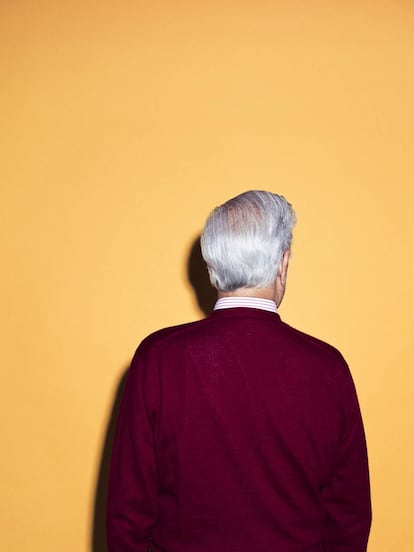
Q. You call him a great intellectual, but he was a man whose politics were always questionable.
A. He wasn’t a true member of the Resistance – he even agreed to replace a teacher who had been dropped on account of being Jewish. He belonged to a part of the Resistance that wasn’t particularly active and I believe he never overcame the complex this gave him and spent the rest of his life making efforts, some of which were grotesque, to earn the ‘progressive’ and ‘revolutionary’ titles. It was a very common need in his time – intellectuals wanted to pass the progressive test because it was what was expected of them. In Latin America, if you weren’t a left-wing intellectual in the 1970s, you simply weren’t an intellectual. You were shut out. Culture was controlled by a left that was very clannish and dogmatic and that had a profound warping effect on cultural life. I think this has changed considerably.
Q. That also happened in Europe.
Today there are injustices, such as discrimination against women that didn’t even figure in the past
A. Of course. Although during my time in England, there were intellectuals who didn’t have an inferiority complex and who came out and fought and that helped me to be honest with myself.
Q. It’s a matter of intellectual honesty.
A. Elites who defend regimes they would never put up with… Bertrand Russell, for example, defended very noble causes and was a very admirable person in many ways but at the same time he defended dreadful things and allowed himself to be manipulated by the left who had no respect for his work or ideas and had not even read them. How do you explain the contradiction? Unfortunately, intelligence is not a guarantee of intellectual honesty.
Q. Should we respect the work of a miscreant?
A. We should not only respect it, it should be published. If you start to judge literature in terms of morals and ethics, it wouldn’t just be decimated, it would disappear – it would lose its raison d’être. Literature expresses what reality tries to hide for a variety of reasons. Nothing stimulates the critical spirit in society so much as good literature. But literature and morality don’t get along. They’re enemies. And you have to respect literature if you believe in freedom.
Q. Does political correctness threaten freedom?
A. Political correctness is the enemy of freedom because it rejects honesty and authenticity. We have to tackle it as the distortion of the truth.
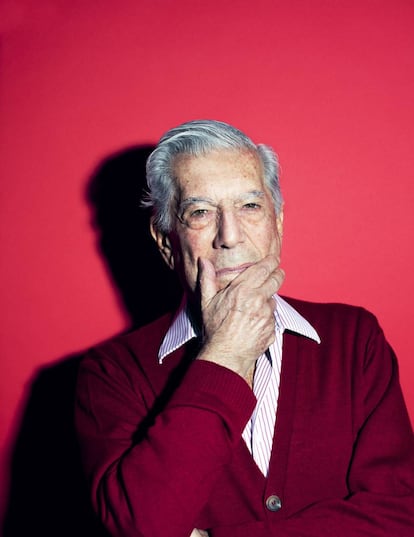
Q. Recently, the term “fake news” has appeared in our midst as though it were something new.
A. New terms for old realities. In the case of misinformation and manipulation, communism was incredibly clever at distorting things, undermining honest people and masking lies with false truths that came to substitute reality.
Q. The Soviet Union has gone, but now we have a new kind of cyber-interference from Moscow that is said to have affected the US elections, the Catalan elections and the electoral campaigns in Mexico and Colombia.
A. What we’ve got is a technological revolution that is perverting the course of democracy rather than strengthening it. It’s technology that could be used for different ends but which the enemies of democracy and freedom are using for their own ends. It’s a reality we need to face up to but unfortunately I believe we still have very limited means of doing so. We are bombarded with a technology that has been used to serve lies and post-truths and which could become, if we don’t rein in the phenomenon, deeply destructive, corrupting civilization, progress and democratic truth.
English version by Heather Galloway.